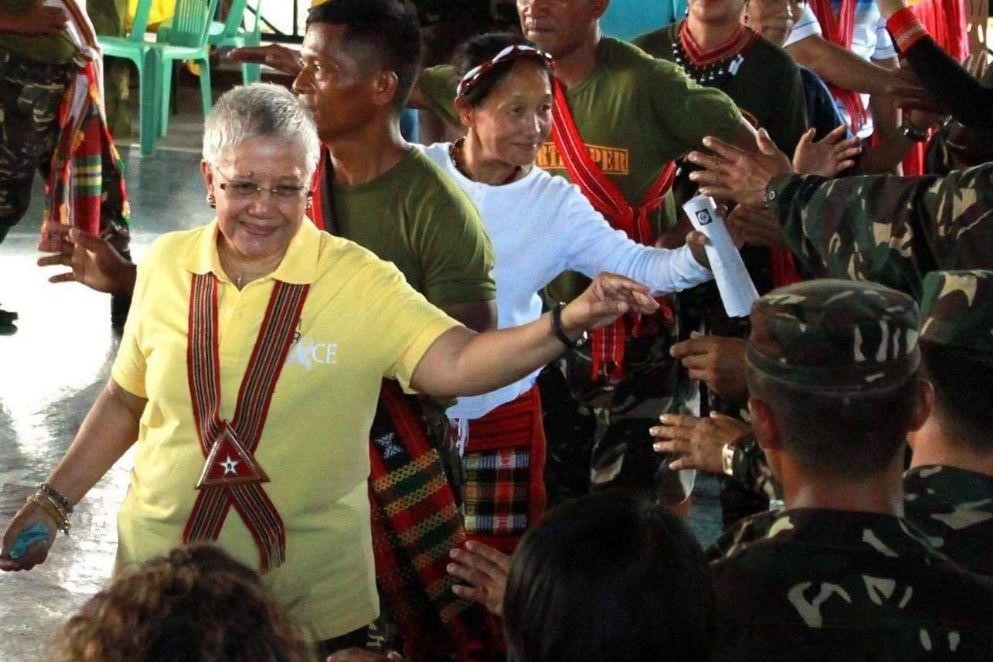SSG/R CHAMPIONS: MEET TERESITA QUINTOS-DELES
Real change begins with understanding
Teresita ‘Ging’ Quintos-Deles, with her pixie haircut and stylish glasses, might well be the smallest person in stature at any negotiating table, but she looms very large indeed as a renowned peace activist and pioneer in security sector reform in the Philippines.
“My engagement in security sector reform came rather late,” says Quintos-Deles, who was a teacher before becoming an activist. In 2003 she was appointed Presidential Adviser on the Peace Process with oversight over multiple ongoing peace processes in the country, including the decades-long conflict in Mindanao, in the southern Philippines. She served in that role from 2003-2005, and again from 2010-2016.
“As a civil society peace advocate you have your cause,” she says. “You don’t think about the actual dynamics of activities on the ground, how it works. You just keep pushing to get what you want.” But once in government, going into conflict areas and working alongside the military on the peace process, her understanding of what it would take to create sustainable peace began to change. She cites a broken-down helicopter and a long car ride with some senior army officers as instrumental in the evolution of her thinking.
“We were stuck traveling in the car together and talking and realized we had stereotypes about each other. It was not ‘every soldier is a human rights violator’ and ‘every civil society activist agitator is a communist rebel’. In civil society we tended to paint all military as black and white, and I saw that there were some good people on the ground.”

Quintos-Deles (left) has worked to help build mutual understanding and respect between security forces and communities.
BRINGING THE LESSONS OF ACTIVISM TO GOVERNMENT, AND VICE VERSA
Under Quintos-Deles’ watch the Comprehensive Agreement on the Bangsamoro was eventually signed in 2014, ending four decades of armed conflict between the Philippine government and the Moro Islamic Liberation Front (MILF).
Along the way there were other peace agreements made, and much work to be done to put in place reforms to help ensure their success. “Under an agreement with the Moro National Liberation Front, there was a provision for the integration of former rebels into the military,” she says, “but no thinking had been done about what that means for the security sector. The whole structure itself would be affected, because it is part of making a military that has a place for everyone.”
In 2005 she left government and co-founded the International Center on Innovation, Transformation and Excellence in Governance (INCITEGov), a policy research and advocacy centre that supports democratic reform initiatives. Quintos-Deles believed democratic reform of the security sector was critical, and that civil society should be part of it.
Her challenge was to develop the interest and knowledge of other activists, most of whom took an adversarial stance to the military on principle. “If you were going to be a peace advocate,” she says, “you have to understand how it worked.”
PUTTING TOGETHER POLICY AND PRACTICE
With DCAF’s support, in partnership with the Friedrich Ebert Foundation, Quintos-Deles set up a study group that brought together civil society leaders of different stripes to learn how the security sector worked, and the challenges of reform. Over the years the study group also served to inform and train politicians and security sector officials.
Thanks to this beginning, and many other initiatives in the years since, Quintos-Deles has played a key role in putting SSG/R on the agenda, which was included for the first time ever in the national security plan of the Philippines. She also was instrumental in the Philippines becoming the first country in Asia-Pacific to implement a National Action Plan on Women, Peace and Security.
“I have seen the transformation that has happened since martial law under Marcos. I have seen how in the military the leadership had shifted so much, and their dreams of becoming a reformed military were embraced by many of the officers that I met and worked with.”
Teresita Quintos-Deles
Despite the earlier gains, however, she is deeply concerned over recent developments in the country. Quintos-Deles remains passionate about the need to restore the momentum of reform and democratic oversight of the security sector in the Philippines. “We have had changes, but how come we haven’t sustained the reforms? There are things we did right, and those seeds are there, and they are somehow growing. We need to ensure there is real change on the ground that will allow these seeds to continue to flourish, instead of go to weeds and thorns.”
Now 72 and a grandmother, Quintos-Deles is still serving as Chairperson of INCITEGov, working alongside legions of young activists she helped educate and inspire. She has sage advice for them: “Have a narrative for reform that is able to tap into the feelings and the aspirations and dreams of ordinary people,” she says. “And keep the faith.”
STORIES FROM THE FIELD
In celebration of DCAF’s 20th anniversary, we are highlighting some of our many partners who have made extraordinary contributions to the field of security sector reform and good governance in their countries.
 Share on Facebook
Share on Facebook Share on Linkedin
Share on Linkedin Share on Twitter
Share on Twitter